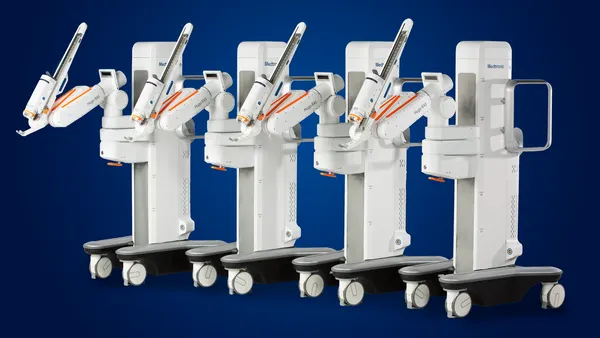Dive Brief:
- FDA announced Friday a draft guide outlining its vision for the development of implantable devices in the brain used to control prosthetic limbs for those who have a limb amputated or are paralyzed.
- Specifically, the document lays out recommendations on what types of clinical and non-clinical testing could help support development of such devices.
- The draft guide is being classified as a "leapfrog" guidance, which means it represents FDA's thoughts on an emerging technology and therefore might change as more research is conducted, according to the agency.
Dive Insight:
The release of the draft guidance follows a Center for Devices and Radiological Health workshop in September 2014 where experts met to discuss brain-computer interface (BCI) devices.
Such devices, when implanted into a patient's brain, aim to work with the nervous and muscular systems to help them regain mobility or a sense of touch, according to FDA.
"One of the outcomes of the workshop was the initiation and generation of the draft guidance," FDA Commissioner Scott Gottlieb said in a statement. "The ultimate aim being to help potential developers of these novel devices address this area of unmet medical need and promote innovation while maintaining appropriate patient protections."
In question is what type of evidence is needed to help support devices through the approval process. FDA suggests non-clinical device testing, such as animal trials, could demonstrate "potential risks have been mitigated prior to initiating a clinical study."
"In most cases, we recommend that you conduct animal testing on a final, finished device to support the assessment that the risks to the subjects are not outweighed by the anticipated benefits to the subjects and the importance of the knowledge to be gained, in a human clinical trial," the draft guidance states.
But the agency notes that such methods "may not sufficiently provide the information needed" and an early feasibility study through an investigational device exemption may be needed "to provide proof of the principle and initial clinical safety data."
"For devices evaluated in early feasibility studies, an animal study using a final, finished device may not be needed if an adequate rationale is provided," FDA said.
One population Gottlieb identified as potential beneficiaries of scientific advancement in the space are veterans of the military.
"Our duty to serve our veterans includes actively pursuing medical advances that protect and treat them during their service and support them in recovering from injuries. We believe that BCI technology has the potential to improve wounded veterans' lives and those of other Americans in regaining mobility and thus improving their quality of life," Gottlieb said.
The realization of such devices may seem a far-off future, but Gottlieb argued we are closer to a discovery than one might believe.
"The idea that a prosthetic could interact with the brain has been the topic of much imagination, but now we're actually on the verge of realizing this opportunity," Gottlieb said. "The FDA has an important role to play by laying out a path for developers on how to seize this prospect and advance the development of new devices."











